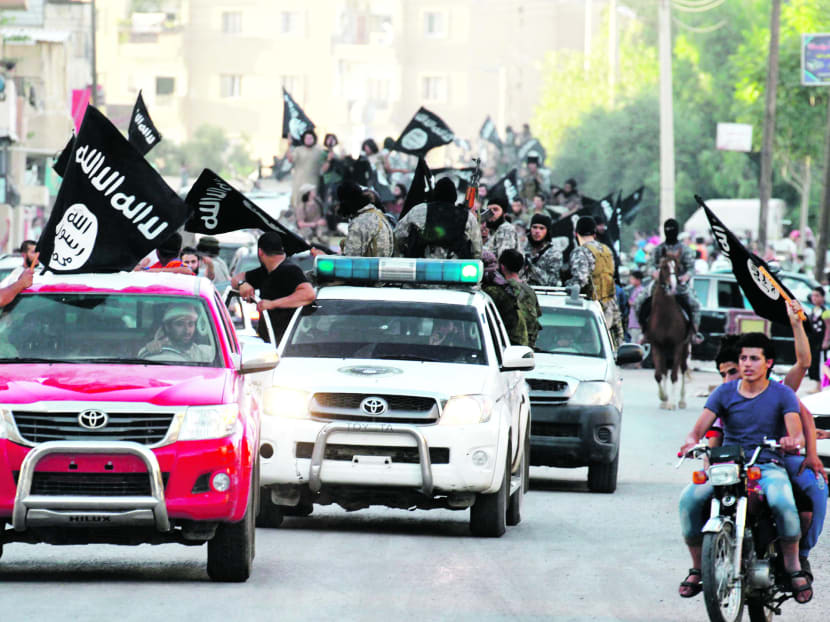Small number of S’poreans ‘have gone to Syria to fight’
SINGAPORE — The Syrian conflict poses a threat to Singapore’s national security, said Deputy Prime Minister Teo Chee Hean in Parliament yesterday as he reiterated the Government’s concerns that Singaporeans could join the fight.

Islamist fighters taking part in a military parade in Syria’s northern Raqqa province. The Syrian crisis has worrying parallels with the Soviet-Afghan
war in the 1980s, said Mr Teo.
Photo: Reuters
SINGAPORE — The Syrian conflict poses a threat to Singapore’s national security, said Deputy Prime Minister Teo Chee Hean in Parliament yesterday as he reiterated the Government’s concerns that Singaporeans could join the fight.
The Government is aware of “a handful” of Singaporeans who have gone to Syria to take part in the conflict, among them a woman believed to have gone there with her foreign husband and two teenage children.
“The whole family is taking part in the conflict in various ways, either joining the terrorist groups to fight, or providing aid and support to the fighters,” said Mr Teo, who is also Home Affairs Minister. The Ministry of Home Affairs (MHA) said it was unable to reveal the name of the woman.
Mr Teo was speaking in response to Member of Parliament for Tampines GRC Irene Ng, who had asked about the growing number of extremists from various countries travelling to Syria to fight and the implications for Singapore. Last month, Prime Minister Lee Hsien Loong had said the Republic was watching the situation carefully, as the conflict would have repercussions for the nation if Singaporeans joined the fight.
Another person who joined the conflict is Haja Fakkurudeen Usman Ali, a naturalised Singaporean from India. Singaporeans who had planned to travel to conflict zones to join the fight but were detected before they could proceed include Abdul Basheer Abdul Kader, Zakaria Rosdan and Khairul Sofri Osman. Abdul Basheer was detained twice in 2007 and 2012 under the Internal Security Act, while the other two were issued Restriction Orders last December.
When asked what would happen to Singaporeans who return home from fighting overseas, an MHA spokesperson said they will be subjected to investigations upon their return to ascertain the extent of their involvement in armed violence overseas.
“Singapore views any attempts by Singaporeans to take part in armed violence overseas seriously, as these individuals have been radicalised to the extent that they are prepared to undertake acts of violence overseas that would have resulted in death and destruction,” the spokesperson said.
“The fact that these acts would have occurred overseas does not make what they did any less of a security concern.”
Rehabilitation for these Singaporeans will only be considered at a later stage when they show signs of being amenable to it, the spokesperson added.
In Parliament, Mr Teo said the number of foreigners who may have joined the fighting in Syria — as many as 12,000 — has exceeded the number of foreign fighters in the Soviet-Afghan war in the 1980s. The Syrian crisis has parallels with that war, which drew several thousand foreign fighters and led to the creation of the terrorist group Al Qaeda.
Al Qaeda subsequently collaborated with regional terrorist group Jemaah Islamiyah (JI) to plan suicide truck bomb attacks against several diplomatic missions here. The plan was foiled when several JI operatives were arrested in 2001.
Mr Teo said foreign fighters in Syria may likewise return from the conflict proficient in terrorist skills and undertake terrorist activities in their home countries or overseas. A Singaporean who has assisted any violent group has “demonstrated the tendency to support” or resort to violence to pursue a political or ideological cause. “They would thus pose a real threat to Singapore’s national security,” he said.
Social cohesion is potentially threatened as the discovery of more Singaporeans fighting or supporting the conflict will cause disquiet on the ground or mistrust and tension between communities, said Mr Teo.
Adding that the Government has worked with communities to protect ethnic relations and social harmony, he praised the Muslim community for playing a key role in these efforts, countering violent extremist ideology and rehabilitating those who had gone down the terrorist path.
When contacted, the Islamic Religious Council of Singapore (MUIS) cited a religious sermon in April that called on Muslims to be sensitive and adopt a cautious attitude when they come across religious edicts or opinions by individuals urging Muslims to kill others.
The sermon, MUIS said, showed Muslim scholars are in agreement that no individual or organisation has the right to declare jihad in the name of Islam and Muslims.
Mr Khalid Shukur Bakri, a community leader who chairs the Touch of Ramadan celebrations, felt Singapore is in a good position to handle any future incidents of Singaporeans becoming foreign fighters. But he cautioned that constant effort is needed to build trust and understanding, as community relations are fragile.







